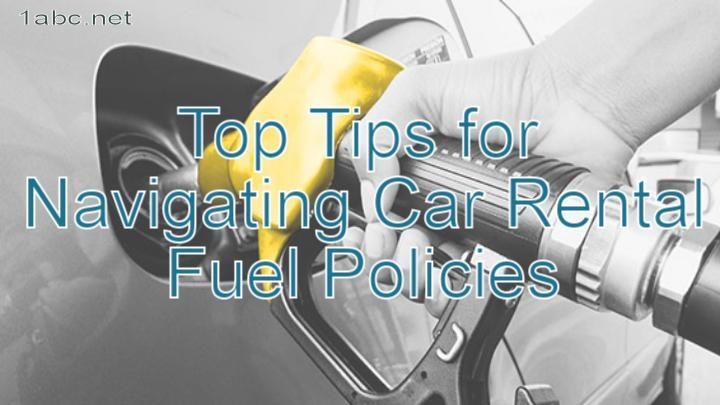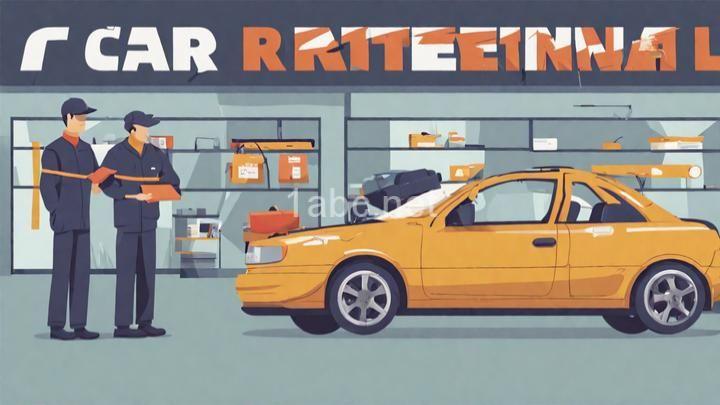Top Tips for Navigating Car Rental Fuel Policies

Introduction:
Renting a car can be an exciting and convenient way to explore a new destination, but understanding car rental fuel policies is essential to avoid unexpected charges and inconveniences. In this blog post, we will provide you with the top tips for navigating car rental fuel policies, ensuring a smooth and hassle-free experience. So, buckle up and let's dive into the world of car rental fuel policies!
I. Know Your Options:
When it comes to car rental fuel policies, it's important to know the different options available to you. The most common options include pre-purchase, full-to-full, and pay-on-return. Let's take a closer look at each of these options:
1. Pre-Purchase Fuel:
Pre-purchasing fuel allows you to pay for a full tank of gas upfront, eliminating the need to refuel before returning the car. This option is ideal for those who want the convenience of not having to worry about refueling at the end of their trip. However, it's important to note that the cost of pre-purchased fuel is typically higher than local gas station prices.
To make the most of pre-purchased fuel, calculate your estimated fuel consumption based on your travel plans. Consider the distance you'll be covering, the fuel efficiency of the car, and the average gas prices in the area. If your estimated fuel consumption aligns with the cost of pre-purchasing fuel, then it may be a cost-effective option for you.
2. Full-to-Full Policy:
The full-to-full policy is a common fuel option offered by car rental companies. With this policy, you pick up the car with a full tank of gas and are expected to return it with a full tank as well. This option allows you to pay for only the fuel you use, making it a cost-effective choice for many travelers.
To ensure you return the car with a full tank of gas, plan ahead and locate nearby gas stations close to your drop-off location. There are also helpful apps available that can assist you in finding fuel stations nearby. By taking a few minutes to plan your route and refuel before returning the car, you can avoid additional charges and save money.
3. Pay-on-Return Option:
For those who prefer not to worry about refueling during their trip, the pay-on-return option may be suitable. With this option, you simply return the car without refueling and pay the car rental company for the fuel used at their set rates. This option can be advantageous for travelers who have a tight schedule or are unsure about finding a gas station near the drop-off location.
However, it's important to estimate your fuel costs before returning the vehicle to avoid any surprises at drop-off. Check the car's fuel gauge and calculate the approximate fuel consumption based on your travel distance and the car's fuel efficiency. This will give you an idea of the expected cost and help you budget accordingly.
IV. Understanding Additional Charges:
To avoid unnecessary charges, it's crucial to understand the potential penalties or fees associated with car rental fuel policies. Some common charges include returning the car without a full tank of gas or using the wrong type of fuel. Rental companies often charge a premium for refueling the vehicle on your behalf or for the inconvenience caused by using the wrong fuel.
To protect yourself, always check the gas station receipt and keep it as proof of refueling. In case of any disputes, having the receipt can help clarify the situation and potentially avoid additional charges. Additionally, be sure to familiarize yourself with the rental company's fuel policies and any specific requirements or restrictions associated with your chosen option.
V. Tips for Saving Money on Fuel:
While navigating car rental fuel policies, it's also worth considering ways to save money on fuel during your rental period. Here are a few tips to help you save:
- Plan your routes efficiently: By mapping out your itinerary and planning the most efficient routes, you can minimize excessive driving and reduce fuel consumption.
- Join loyalty programs: Many car rental companies have loyalty programs that offer discounts or rewards for frequent renters. Take advantage of these programs to save on fuel costs.
- Drive responsibly and practice fuel-efficient habits: Avoid aggressive driving, excessive idling, and speeding, as these can significantly impact fuel efficiency. Additionally, make sure to keep the car well-maintained by checking tire pressure and adhering to recommended service intervals.
Conclusion:
Understanding car rental fuel policies is essential for a hassle-free car rental experience. By knowing your options, such as pre-purchase, full-to-full, and pay-on-return, you can choose the best fuel policy based on your travel plans. Remember to familiarize yourself with the specific policies and any associated charges. By following these top tips for navigating car rental fuel policies, you'll be well-equipped to avoid unnecessary charges, save money, and enjoy a smooth and worry-free journey. Safe travels!
FREQUENTLY ASKED QUESTIONS
What are car rental fuel policies?
Car rental fuel policies vary depending on the rental company and location. Here are some common fuel policies you might come across:
- Full to Full: With this policy, you receive the rental car with a full tank of fuel, and you are expected to return it with a full tank as well. If you fail to do so, you may be charged a refueling fee along with the cost of the missing fuel.
- Prepaid Fuel: Some rental companies offer a prepaid fuel option where you pay for a full tank of fuel upfront. With this policy, you can return the car with any fuel level, as the cost has already been covered.
- Fuel Purchase Option: This policy allows you to prepay for a full tank of fuel at a set price when you pick up the car. You can then return the car with any fuel level, regardless of whether the tank is full or not.
- Fuel Charge: In some cases, the rental company may charge you for the fuel consumed during the rental period at their own rates, regardless of the initial fuel level. This policy is commonly referred to as "paying at the pump."
Always make sure to carefully read and understand the fuel policy before renting a car to avoid any unexpected charges.
How do car rental fuel policies work?
Car rental fuel policies vary depending on the rental company and location, but here are some common types:
- Full-to-Full Policy: This is the most common fuel policy. You receive the car with a full tank, and you're expected to return it with a full tank. If the tank is not fully filled, you may be charged a refueling fee and the cost of the missing fuel.
- Pre-Purchase Fuel Option: Some rental companies offer the option to pre-purchase a full tank of fuel at a set price when you pick up the car. With this option, you can return the car with any fuel level, as you've already paid for a full tank.
- Pre-Defined Fuel Level: Some rentals may specify the fuel level at which you should return the car, such as half a tank. If you return it with less fuel, you may be charged for the missing amount and possibly a refueling fee.
- Fuel Charged at Return: With this policy, you return the car with the same fuel level you received it, and the rental company charges you for the fuel used at their rate per gallon/litre. It's important to note that the charged rate is often higher than the local market price.
- No Refund for Unused Fuel: In some cases, if you purchase a full tank of fuel upfront but return the car with fuel remaining, there may be no refund for the unused fuel. Therefore, it's essential to consider your expected fuel usage before selecting this option.
When renting a car, it's always advisable to carefully read and understand the fuel policy provided by the rental company. This way, you can plan accordingly and avoid any unexpected charges related to fuel.
What is a full-to-full fuel policy?
A full-to-full fuel policy is a type of arrangement commonly used by car rental companies. With this policy, when you pick up the rental car, it has a full tank of fuel. You are then expected to return the car with a full tank of fuel as well.
This policy ensures that you only pay for the fuel you actually use during the rental period. It is also a convenient option as you don't have to worry about estimating how much fuel you will need in advance or paying for fuel you don't end up using.
How should I choose the right fuel policy for my needs?
Choosing the right fuel policy depends on your specific needs and preferences. Here are a few factors to consider:
- Full to Full: With this policy, you receive the rental car with a full tank and return it with a full tank. This is often the most cost-effective option if you can conveniently find nearby gas stations.
- Pre-purchase Fuel: Some car rental agencies offer the option to pre-purchase a full tank of fuel at a set price. This may be convenient if you don't want to worry about refueling before returning the car, but make sure the price is competitive compared to local gas prices.
- Fuel Upfront: In this case, you pay for a full tank of fuel at a set price when picking up the car and can return it with any amount left in the tank. This can be convenient if you are unsure how much fuel you will need and want to avoid additional charges.
It's important to carefully read and understand the terms and conditions of each policy before making a decision. Consider factors such as your anticipated mileage, local gas prices, and convenience of nearby gas stations.
Can I get a refund if I return the rental car with more fuel than required?
It's unlikely that you will receive a refund for returning a rental car with more fuel than required. Most car rental companies have a policy in place where customers are either required to return the car with the same level of fuel as when they received it or pay for any missing fuel upon return. However, it's always a good idea to check with the specific rental company you are using to confirm their policy regarding fuel refunds.




